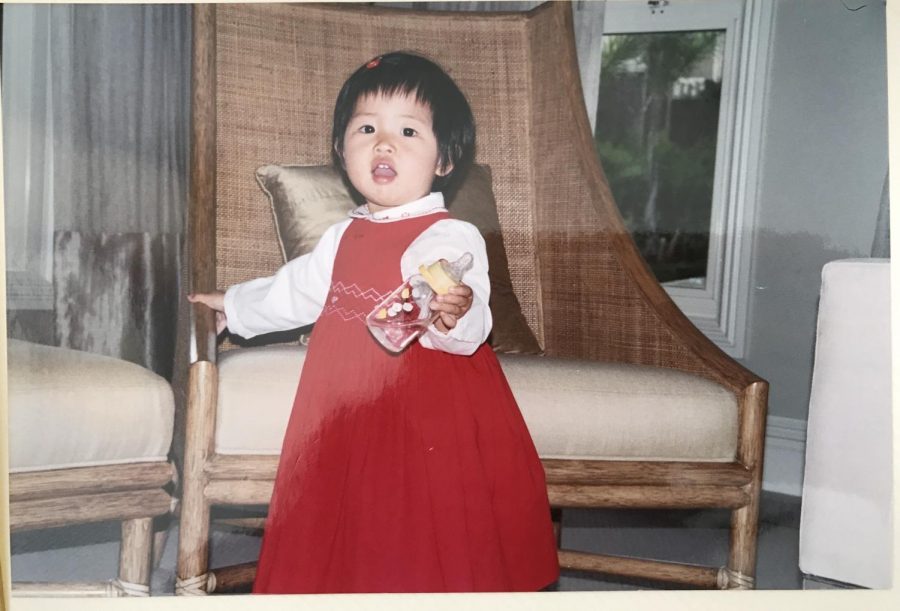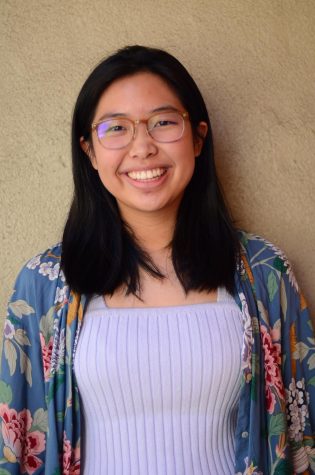What does home mean?
Gloria poses in a photo as a child. To her, home is where her family and friends embrace her.
January 19, 2018
“Kia Ora,” he said, as he flipped to the photo page of my black passport, the silver ferns lining the edges reflecting the ceiling light.
“Excuse me?” my mind was focused on the accumulating airport security line, struggling to process the simple words.
“You’re from New Zealand, right?” his eyes squinted a little, unable to understand my confusion.
Kia Ora, Kia Ora, Kia Ora, I thought, while tugging my red carry-on along the carpeted floor of the aircraft en route to Auckland last winter. Clearly, those six letters would plague me for the rest of the vacation. Pressing down the plastic button, I collapsed the handle and hoisted the luggage in the overhead bin. Over by my seat was a furry blanket that called out for me. Yet instead, I could only concentrate on the bolded words affixed to the in-flight magazine: Kia Ora. Then the straightforward translation appeared in my thoughts: hello.
Simply said, I am an “ABC”, or rather an “NBC”, a term made by Chinese people denoting a new generation of Chinese people born overseas, usually in the United States, thus American-born Chinese. Common cultural identity issues for some foreign-born Chinese are the inability to fluently read and write in Chinese and a difference in pop culture preferences. However, the identity issue involving the true destination of home is less typical.
I was born in Auckland, the largest city in New Zealand. My family moved back to China, then left to Canada and Australia, all before I was seven years old. At six years and 11 months old, we moved to Hong Kong, where I attended an English international school, Peak School. My finally-perfected Australian accent soon jumbled up again. Even though I had yet to understand the philosophical definition of home, I felt at home with my peers. Our international school was the perfect definition of a mosaic; my best friend is Malaysian and Australian, the best dancer is Canadian, my dance buddy is an half Thai and half British, and the class artist is born in Pakistan and raised in Hong Kong.
Years later in fall of 2014, I fidgeted with the gray straps of my black and white zebra print backpack, as I trod up the slope of Harker Middle School. I had this incessant fear of loneliness; I was new to the country and had nothing to relate with anyone. For the first time, I knew that this place was not my home. At least in Australia, my whole family were citizens; in New Zealand, I was greeted with “Welcome home, Kiwi!” every time at border control; in China, I had all my relatives, and in Canada, well, I was too young to remember much.
However, I did make two of my best friends at Harker, who were both born and raised in California. Basking in constant laughter and inside jokes, I recognized that I was no longer lonely and belonged in the Golden State. Nevertheless, on a daily basis, whether in class or at the airport, words and actions reminded me that I’m not American, and that bruised me. Since 11 years old, I began speaking with an American accent, studied my U.S history, and laugh at regional memes. I experienced as much of this culture as my friends, yet technically this was not my home.
As I fluffled the pillow on my airplane seat, I anticipated the moment I landed in my birth country. I wanted to learn the history, the inside jokes, the native language, and how to be a true New Zealander. Over the course of a few days, smiles and warmth pervaded my thoughts. I pronounced every word incorrectly, yet was welcomed like family – exactly like in California.
Soon, I realized my home was not limited by the border lines drawn on a map, but was where my family and friends embraced me. I knew my family would travel to any place for me and my friends would forever welcome me into their home. I found my home.


















![“[Building nerf blasters] became this outlet of creativity for me that hasn't been matched by anything else. The process [of] making a build complete to your desire is such a painstakingly difficult process, but I've had to learn from [the skills needed from] soldering to proper painting. There's so many different options for everything, if you think about it, it exists. The best part is [that] if it doesn't exist, you can build it yourself," Ishaan Parate said.](https://harkeraquila.com/wp-content/uploads/2022/08/DSC_8149-900x604.jpg)




![“When I came into high school, I was ready to be a follower. But DECA was a game changer for me. It helped me overcome my fear of public speaking, and it's played such a major role in who I've become today. To be able to successfully lead a chapter of 150 students, an officer team and be one of the upperclassmen I once really admired is something I'm [really] proud of,” Anvitha Tummala ('21) said.](https://harkeraquila.com/wp-content/uploads/2021/07/Screen-Shot-2021-07-25-at-9.50.05-AM-900x594.png)







![“I think getting up in the morning and having a sense of purpose [is exciting]. I think without a certain amount of drive, life is kind of obsolete and mundane, and I think having that every single day is what makes each day unique and kind of makes life exciting,” Neymika Jain (12) said.](https://harkeraquila.com/wp-content/uploads/2017/06/Screen-Shot-2017-06-03-at-4.54.16-PM.png)








![“My slogan is ‘slow feet, don’t eat, and I’m hungry.’ You need to run fast to get where you are–you aren't going to get those championships if you aren't fast,” Angel Cervantes (12) said. “I want to do well in school on my tests and in track and win championships for my team. I live by that, [and] I can do that anywhere: in the classroom or on the field.”](https://harkeraquila.com/wp-content/uploads/2018/06/DSC5146-900x601.jpg)
![“[Volleyball has] taught me how to fall correctly, and another thing it taught is that you don’t have to be the best at something to be good at it. If you just hit the ball in a smart way, then it still scores points and you’re good at it. You could be a background player and still make a much bigger impact on the team than you would think,” Anya Gert (’20) said.](https://harkeraquila.com/wp-content/uploads/2020/06/AnnaGert_JinTuan_HoHPhotoEdited-600x900.jpeg)

![“I'm not nearly there yet, but [my confidence has] definitely been getting better since I was pretty shy and timid coming into Harker my freshman year. I know that there's a lot of people that are really confident in what they do, and I really admire them. Everyone's so driven and that has really pushed me to kind of try to find my own place in high school and be more confident,” Alyssa Huang (’20) said.](https://harkeraquila.com/wp-content/uploads/2020/06/AlyssaHuang_EmilyChen_HoHPhoto-900x749.jpeg)







